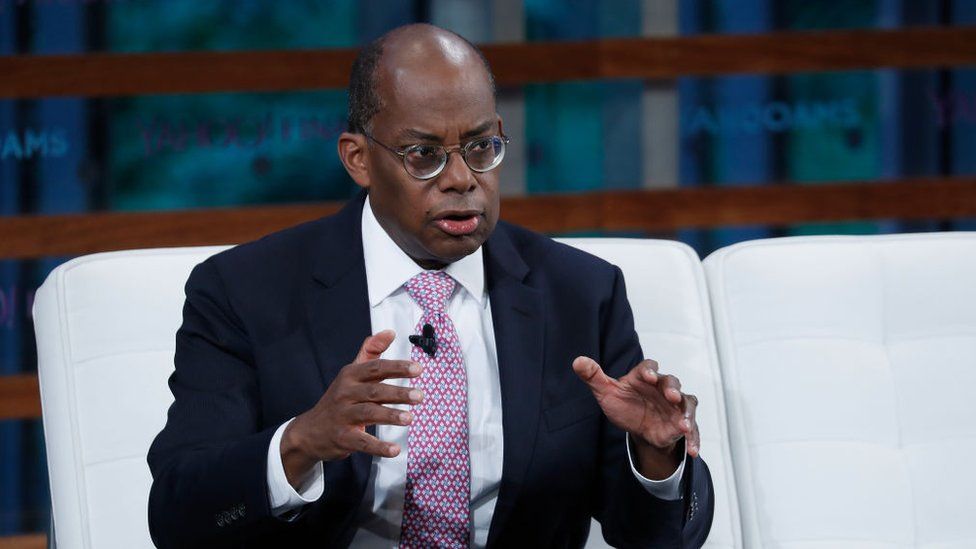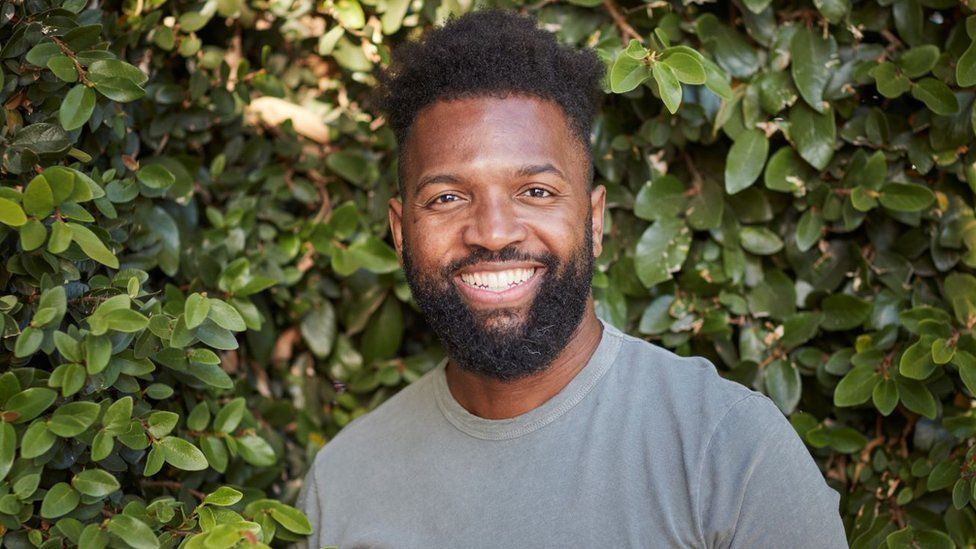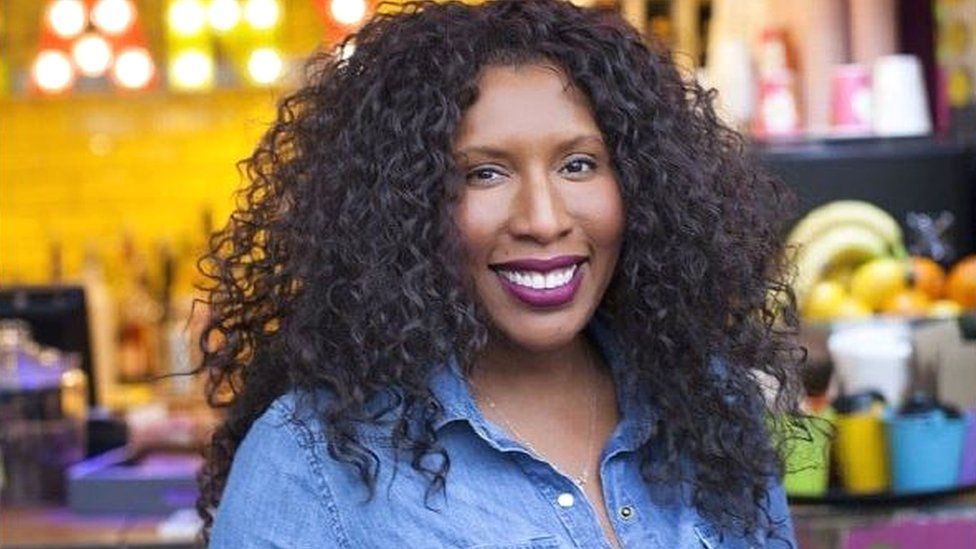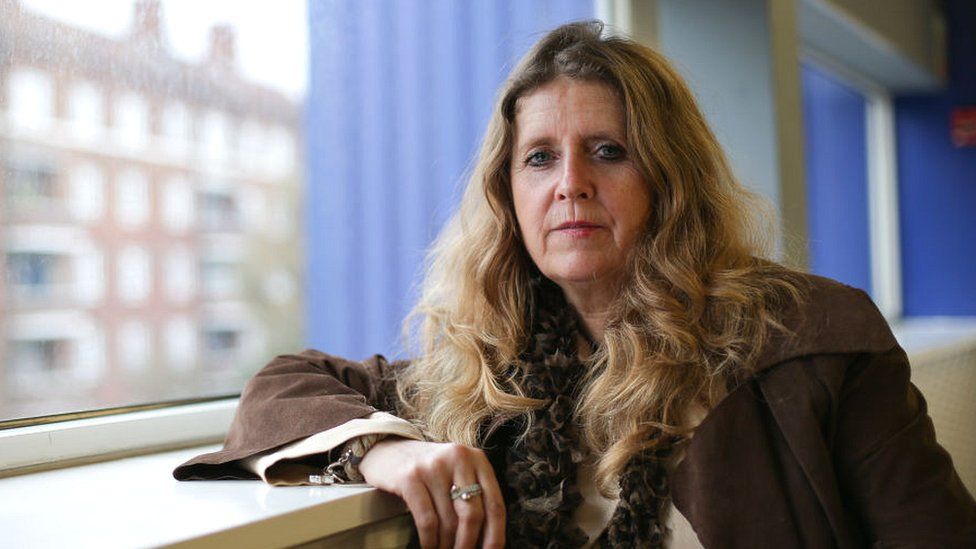
George Floyd's murder at the hands of police in the US city of Minneapolis last year shocked the world and prompted a reckoning on race.
Businesses were quick to speak out, from #BlackLivesMatter posts to promises to fight racism, pay inequality and diversity at work.
Yet a year later, boardrooms remain overwhelmingly white and black workers dominate low-wage, entry-level jobs.
Roger Ferguson is a rarity in corporate America. One of just five black chief executives (CEO) running a US Fortune 500 firm until this March, when he stepped down from the helm of financial services giant TIAA.
He was one of Wall Street's elite, yet still faced racism: "I still found it difficult to get a taxi going uptown in Manhattan," he tells BBC World TV's Talking Business programme.
He recalls another time he was mistaken for a waiter at a corporate dinner. "One of the guests called me over thinking I was a waiter and said 'I've dropped my spoon, will you pick it up?'."
"This has nothing to do with position, socio-economic status, what you might be wearing. It has everything to do with the colour of one's skin."
Mr Ferguson believes any changes sparked by George Floyd's murder will take years to see.
"The death of George Floyd, and many other related matters that all came crashing down around the same time, have forced corporate America to take another look at our black employees and give them a bit more voice."
"America has been on a journey regarding race for well over 400 years," he adds.
"This will take time, patience and persistence to move corporate America and all of America forward towards the dream of equality that all of us share in this country."
His departure from TIAA makes boardrooms across the world's richest economies even whiter. In the US, there have only been 19 black CEOs out of 1,800 bosses in the 66-year history of the Fortune 500 list. In Britain, there are no black chairmen, CEOs or financial chiefs in FTSE 100 firms.

Baratunde Thurston has been advising bosses as they grapple with racial inequality alongside revenues. He is a podcaster and the author of How To Be Black, and advised the Obama White House.
"At the light end, there's been a heavy PR-managed crisis response. Let's use certain hashtags, put up a post on our website, say Black Lives Matters - and hope this is all over by the next quarter so we can get back to business.
"At the deeper end, I've seen organisations not just focus externally on what they can do in the world, but look inside and listen to their black employees."
He advises firms to centre on truth and reconciliation: "Take stock of the history of your organisation. Be open to listening to your employees, there are probably things you're not hearing because they haven't trickled up to you."
Roger Ferguson urges CEOs to look at the economic gains of inclusivity:
"We should not think of closing the wealth gap between blacks and whites in America as a zero sum game - some win and some must lose. If we close the racial wealth gap in America, the entire GDP of this country could be 4-6% higher, that's really quite a move."

Melanie Eusebe founded the Black British Business Awards and is Accenture's inclusion and diversity lead. She says bosses must look at equality in pay, promotion, culture and hiring.
"Promotion and retention means looking at barriers that underrepresented communities face and investing in accelerator programmes."
She emphasises that business leaders need to drive this cultural change: "CEOs and boards must take responsibility for how they foster inclusive workforces and cultures."
The murder of George Floyd jolted some of the world's biggest companies into social action. Sony Music Group (SMG) created a $100m Global Social Justice Fund to fight racial injustice.
"We are forging deep, meaningful partnerships with global organisations to scale their local efforts to fight intolerance," says Towalame Austin, SMG's executive vice president, philanthropy and social impact.
Sony's fund has flowed across the Atlantic to help the UK charity Key4Life. It aims to curb youth re-offending through rehabilitation programmes and works with firms in construction, banking and media, to encourage them to hire ex-offenders.

Key4Life founder Eva Hamilton says corporate support, especially during the pandemic, has been critical: "Employment is the single most important route out of crime. But more than 50% of companies will not employ an offender."
Ms Hamilton wonders if fear is fuelling corporate activity: "I feel some companies were very quick to respond in the wake of George Floyd. I wonder are they're coming from a place of fear or are they genuinely concerned?"
One year on, she says expectations have changed: "We're entering a new world of equality and opportunity. Companies that don't comply will be called out."
Melanie Eusebe says she is seeing more progressive company policies - such as making supply chains, sales and services more diverse - in order to woo a wider consumer base.
"By improving an organisations' progressiveness, you are not only doing the right thing - it's just good business."
For Roger Ferguson, it's a far cry from his childhood growing up in a segregated Washington DC.
"I had to stand in the back of a major department stores waiting for my aunt the seamstress, to come out to measure my little suit jacket, to a place today where it's far from perfect. But we have certainly made progress."
Baratunde Thurston's optimism is tempered. "The sad truth is, I know we will be having some version of this conversation in 10 years' time. My optimism says, we can always do better. We have to try."

You can watch Talking Business with Aaron Heslehurst, on BBC World News, for full details of broadcast times click here.
"really" - Google News
May 30, 2021 at 05:52PM
https://ift.tt/3vAvkci
Are businesses really tackling racial inequality? - BBC News
"really" - Google News
https://ift.tt/3b3YJ3H
https://ift.tt/35qAk7d
Bagikan Berita Ini














0 Response to "Are businesses really tackling racial inequality? - BBC News"
Post a Comment